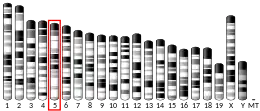Serine/threonine-protein kinase TAO3 is an enzyme that in humans is encoded by the TAOK3 gene.[5][6][7]
References
- 1 2 3 GRCh38: Ensembl release 89: ENSG00000135090 - Ensembl, May 2017
- 1 2 3 GRCm38: Ensembl release 89: ENSMUSG00000061288 - Ensembl, May 2017
- ↑ "Human PubMed Reference:". National Center for Biotechnology Information, U.S. National Library of Medicine.
- ↑ "Mouse PubMed Reference:". National Center for Biotechnology Information, U.S. National Library of Medicine.
- ↑ Tassi E, Biesova Z, Di Fiore PP, Gutkind JS, Wong WT (Dec 1999). "Human JIK, a novel member of the STE20 kinase family that inhibits JNK and is negatively regulated by epidermal growth factor". J Biol Chem. 274 (47): 33287–95. doi:10.1074/jbc.274.47.33287. PMID 10559204.
- ↑ Zhang W, Chen T, Wan T, He L, Li N, Yuan Z, Cao X (Sep 2000). "Cloning of DPK, a novel dendritic cell-derived protein kinase activating the ERK1/ERK2 and JNK/SAPK pathways". Biochem Biophys Res Commun. 274 (3): 872–9. doi:10.1006/bbrc.2000.3244. PMID 10924369.
- ↑ "Entrez Gene: TAOK3 TAO kinase 3".
Further reading
- Yoneda T, Imaizumi K, Oono K, et al. (2001). "Activation of caspase-12, an endoplastic reticulum (ER) resident caspase, through tumor necrosis factor receptor-associated factor 2-dependent mechanism in response to the ER stress". J. Biol. Chem. 276 (17): 13935–40. doi:10.1074/jbc.M010677200. PMID 11278723.
- Strausberg RL, Feingold EA, Grouse LH, et al. (2003). "Generation and initial analysis of more than 15,000 full-length human and mouse cDNA sequences". Proc. Natl. Acad. Sci. U.S.A. 99 (26): 16899–903. Bibcode:2002PNAS...9916899M. doi:10.1073/pnas.242603899. PMC 139241. PMID 12477932.
- Yustein JT, Xia L, Kahlenburg JM, et al. (2003). "Comparative studies of a new subfamily of human Ste20-like kinases: homodimerization, subcellular localization, and selective activation of MKK3 and p38". Oncogene. 22 (40): 6129–41. doi:10.1038/sj.onc.1206605. PMID 13679851. S2CID 21434404.
- Ota T, Suzuki Y, Nishikawa T, et al. (2004). "Complete sequencing and characterization of 21,243 full-length human cDNAs". Nat. Genet. 36 (1): 40–5. doi:10.1038/ng1285. PMID 14702039.
- Hartmann TB, Thiel D, Dummer R, et al. (2004). "SEREX identification of new tumour-associated antigens in cutaneous T-cell lymphoma". Br. J. Dermatol. 150 (2): 252–8. doi:10.1111/j.1365-2133.2004.05651.x. PMID 14996095. S2CID 42495130.
- Gerhard DS, Wagner L, Feingold EA, et al. (2004). "The status, quality, and expansion of the NIH full-length cDNA project: the Mammalian Gene Collection (MGC)". Genome Res. 14 (10B): 2121–7. doi:10.1101/gr.2596504. PMC 528928. PMID 15489334.
- Rual JF, Venkatesan K, Hao T, et al. (2005). "Towards a proteome-scale map of the human protein-protein interaction network". Nature. 437 (7062): 1173–8. Bibcode:2005Natur.437.1173R. doi:10.1038/nature04209. PMID 16189514. S2CID 4427026.
- Kimura K, Wakamatsu A, Suzuki Y, et al. (2006). "Diversification of transcriptional modulation: large-scale identification and characterization of putative alternative promoters of human genes". Genome Res. 16 (1): 55–65. doi:10.1101/gr.4039406. PMC 1356129. PMID 16344560.
This article is issued from Wikipedia. The text is licensed under Creative Commons - Attribution - Sharealike. Additional terms may apply for the media files.




